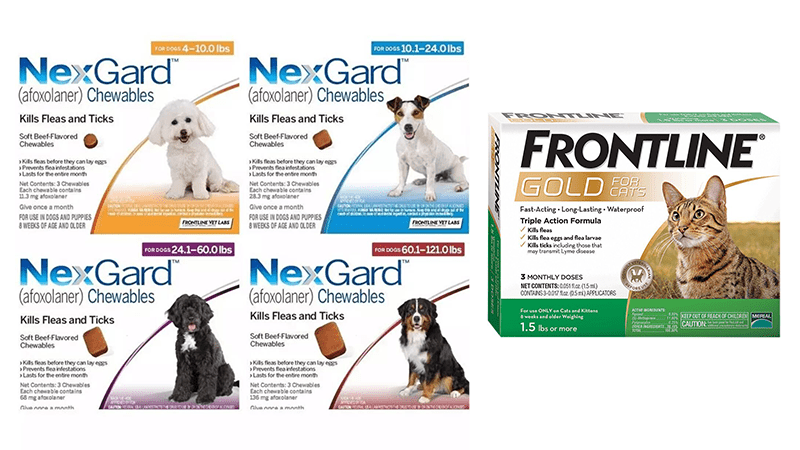Yesterday we opened our conversation about these pesky parasites by explaining the differences between fleas and ticks and discussing the harm they can cause to your pets. If you missed this post, make sure to check it out before jumping into Part 2!
Today we’d like to talk about flea and tick preventatives and why they are important. We’ll highlight the two preventatives that House Paws recommends (Frontline Gold and NexGard) and their differences. We’ll also cover reasons why your pet may need to be on these preventatives throughout the year rather than just in the summer months.
(Allow 5 minutes to read full post)
Now that we’ve covered the dangers of fleas and ticks, how can you keep them out of your home and away from your furry family members? To prevent your precious pets from contracting tick-borne diseases or flea infestations, give them a monthly preventative. House Paws recommends two different types of flea/tick preventatives. Let’s discuss the differences.
NexGard is a beef-flavored chewable tablet that is given monthly, just like Frontline. This preventative kills adult fleas before they can lay eggs. It also kills ticks and prevents some tick-borne infections. NexGard is for dogs only.
Today we’d like to talk about flea and tick preventatives and why they are important. We’ll highlight the two preventatives that House Paws recommends (Frontline Gold and NexGard) and their differences. We’ll also cover reasons why your pet may need to be on these preventatives throughout the year rather than just in the summer months.
(Allow 5 minutes to read full post)
Now that we’ve covered the dangers of fleas and ticks, how can you keep them out of your home and away from your furry family members? To prevent your precious pets from contracting tick-borne diseases or flea infestations, give them a monthly preventative. House Paws recommends two different types of flea/tick preventatives. Let’s discuss the differences.
Preventative Options
Frontline Gold is a topical preventative that is applied to the pet’s neck and back once a month. Pets need to go 24 hours after application before they can be bathed, to make sure that the Frontline is effective. This preventative kills adult fleas and ticks, and kills flea eggs and larvae before they can develop into adults. It also kills chewing lice. Frontline Gold comes in both cat and dog versions.NexGard is a beef-flavored chewable tablet that is given monthly, just like Frontline. This preventative kills adult fleas before they can lay eggs. It also kills ticks and prevents some tick-borne infections. NexGard is for dogs only.
Why Year-Round Preventatives?
Ticks and fleas are more of an issue in the summer because of the warmer temperatures, but they can be out in the winter too. Ticks will burrow down into the ground when temperatures drop below freezing, but they come up looking for food (blood) any day that temperatures exceed 33 degrees. Fleas are more common in the South year-round, because they prefer warm humid temperatures. Unfortunately, they are passed from host to host so easily that northern states like Minnesota have plenty of the little buggers to go around. Most animals in Minnesota are at risk of contracting fleas and tick-borne diseases during the warmer months, as long as they go outdoors or live with pets do. But should your pets be on tick and flea preventatives during the colder months as well? If any of the following describes your pets, you may want to keep them on Frontline Gold or NexGard all year:- Pets who travel to the south during the winter.
- Pets who go to doggy daycare and/or boarding facilities in the winter.
- Pets who spend time in the winter with other pets who could have fleas.
- Pets who spend time in tick habitats on warmer winter days (wooded or grassy areas, trails, leaves).
If you aren’t sure whether Frontline Gold or Nexgard is a good fit for your pet, feel free to ask us! Being a mobile vet, we have the opportunity to see your pet’s environment first-hand, making it easier for us to determine your pet’s individual risk of exposure to fleas or ticks. We would also be happy to answer any questions you have about fleas and ticks, their diseases, and pet preventatives.






